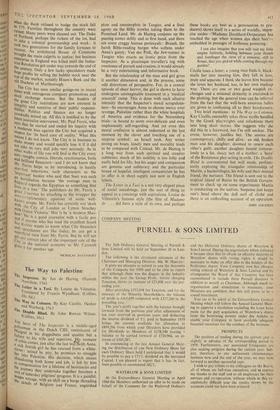The Way to Palestine
The Inspector. By Jan de Hartog. (Hamish Hamilton, 15s1)
The Way to Colonos. By Kay Cicellis. (Seeker and Warburg, 15s.) the Double Blind. By John Rowan Wilson. (Collins, 16s.) Tilfi hero of The Inspector is a middle-aged Policeman in the Dutch CID, reminiscent of M. aigret in his doggedness and qualms but a failure to his wife and superiors. Its moment of crisis comes, just after the last waY,Vvith Anna, a sick Jewish girl he has rescued from a white- Slaver : seized by pity, he promises to smuggle her into Palestine. His decision, which means !handoning both home and job, is felt by him co.Mpcnsation for a lifetime of hesitancies and "le Journey they undertake together becomes a sort of latterday pilgrims' progress. It is a painful, t k,,nder voyage, with an idyll on a barge threading he ctinals of Belgium and France, anguished
plots and counterplots in Tangier, and a final agony on the filthy trawler taking them to the Promised Land. Mr. de Hartog conjures up the passing scenes deftly and at first hand, and there • are some craggy human portrayals: Brandt, the harsh Bible-reading bargee who softens under Anna's gaiety; Van der Pink, the Jew-runner in Tangier who exacts an ironic price from the Inspector. As a picaresque traveller's log with overtones of pursuit and evasion, it would already be a very entertaining and informative book.
But the relationship of the man and girl gives it another dimension and, in the process, some odd distortions of perspective. For, in a central episode of sheer horror, the girl is shown to have undergone unimaginable treatment in a 'medical research' camp. This is done with such allusive intensity that the Inspector's moral scrupulous- ness—he encourages Anna to choose mercy over revenge, Palestine rather than the white hospitals of America and evidence for the Nuremberg trials—is bound to seem over-delicate and even unpleasantly self-regarding. And yet even this moral confusion is almost redeemed at the last, moment by the clever and touching use of a surprise symbol: an Israeli tank. Any writer strong on boats, lonely men and morality tends to be compared with Conrad. Mr. de Hartog is a long way from such spiritual and creative subtleties; much of his nobility is too lofty and easily held for life; but his anger and compassion are genuine and unliterary and the particular brand of hopeful, intelligent romanticism he has to offer is in short supply just now in English letters.
The Letter in a Taxi is a not very elegant piece of social anecdotage, just the sort of thing to
appeal to a concierge with aspirations. Louise de Vilmorin's famous style (the film of Madame de . . . did have a style of its own, and perhaps
these books are best as a provocation to pro- ducers) shows itself in a series of worldly, impre- cise asides—`Madame Doublard-Despaumes has reached the age when women dye their hair'— embedded in passages of hothouse posturing:
I can also imagine that you will visit my little empire furtively, holding between your thumb and forefinger the stem of a remorse, still in flower, that you picked while coming through my garden!
Cdcilie loses a letter; a young man finds it, black-
mails her into meeting him, they fall. in love, mate and separate. I think she leaves him because she loves her husband, too, in her own madcap way. There are one or two good waspish ex- changes and a minimal dexterity is exercised. in the plotting, but the general tone can be inferred from the fact that the well-born amorous ladies are given to confessing all to their hairdressers.
Two brief mentions: in The Way to Colonos,
Kay Cicellis ostensibly takes three myths handled by the Greek playwrights and refashions them into long short stories. She suggests why she did this in a foreword, but I'm still unclear. The event, however, justifies her. The stories are contemporary, chilly and alive: an old, broken man and his daughter, doomed to renew each other's guilt; another daughter bound remorse- lessly to a fat, sleazy tart of a mother; a 'hero' of the Resistance play-acting in exile. The Double Blind is conventional but well made, perfunc- torily exploring the triangular relationship of Martin, a bacteriologist, his wife and their mutual friend, the narrator. The friend is sent out to the tropical island of Batou by the British Govern- ment to check up on some experiments Martin is conducting on the natives. Suspense just keeps one's head above the dull surf of clichd and there is an enthralling account of an operation.


































 Previous page
Previous page